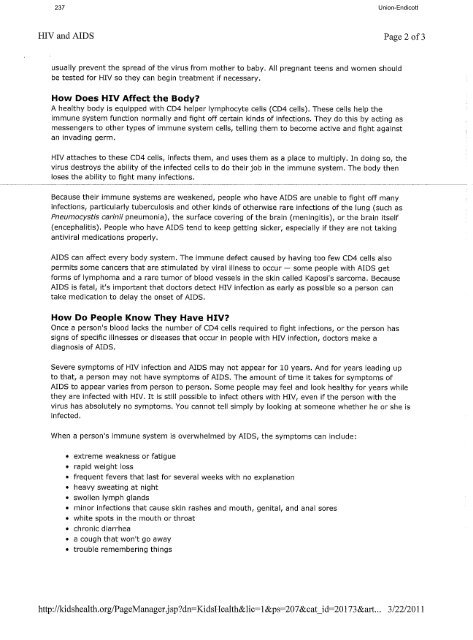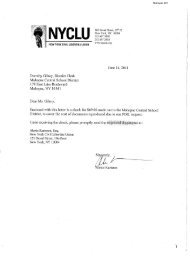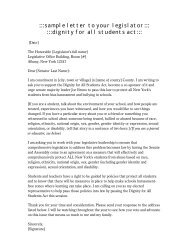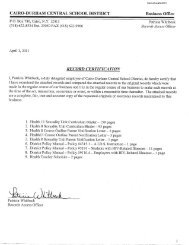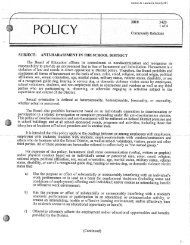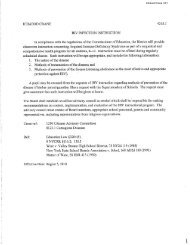t - New York Civil Liberties Union
t - New York Civil Liberties Union
t - New York Civil Liberties Union
You also want an ePaper? Increase the reach of your titles
YUMPU automatically turns print PDFs into web optimized ePapers that Google loves.
237<br />
<strong>Union</strong>-Endicott<br />
HIVandAIDS<br />
Page 2 of3<br />
usually prevent the spread of the virus from mother to baby. All pregnant teens and women should<br />
be tested for HIV so they can begin treatment if necessary.<br />
How Does HIV Affect the Body?<br />
A healthy body is equipped with CD4 helper lymphocyte cells (CD4 cells). These cells help the<br />
immune system function normally and fight off certain kinds of infections. They do this by acting as<br />
messengers to other types of immune system cells, telling them to become active and fight against<br />
an invading germ.<br />
HIVattaches to these CD4 cells, infects them, and uses them as a place to multiply. In doing so, the<br />
virus destroys the ability of the infected cells to do their job in the immune system. The body then<br />
loses the ability to fight many infections.<br />
Because their immune systems are weakened, people who have AIDS are unable to fight off many<br />
infections, particularly tuberculosis and other kinds of otherwise rare infections of the lung (such as<br />
Pneumocystis certnit pneumonia), the surface covering of the brain (meningitis), or the brain itself<br />
(encephalitis). People who have AIDS tend to keep getting sicker, especially if they are not taking<br />
antiviral medications properly.<br />
AIDS can affect every body system. The immune defect caused by having too few CD4 cells also<br />
permits some cancers that are stimulated by viral illness to occur - some people with AIDS get<br />
forms of lymphoma and a rare tumor of blood vessels in the skin called Kaposi's sarcoma. Because<br />
AIDS is fatal, it's important that doctors detect HIV infection as early as possible so a person can<br />
take medication to delay the onset of AIDS.<br />
How Do People Know They Have HIV?<br />
Once a person's blood lacks the number of CD4 cells required to fight infections, or the person has<br />
signs of specific illnesses or diseases that occur in people with HIV infection, doctors make a<br />
diagnosis of AIDS.<br />
Severe symptoms of HIV infection and AIDS may not appear for 10 years. And for years leading up<br />
to that, a person may not have symptoms of AIDS. The amount of time it takes for symptoms of<br />
AIDS to appear varies from person to person. Some people may feel and look healthy for years while<br />
they are infected with HIV. It is still possible to infect others with HIV, even if the person with the<br />
virus has absolutely no symptoms. You cannot tell simply by looking at someone whether he or she is<br />
infected.<br />
When a person's immune system is overwhelmed by AIDS, the symptoms can include:<br />
• extreme weakness or fatigue<br />
• rapid weight loss<br />
• frequent fevers that last for several weeks with no explanation<br />
• heavy sweating at night<br />
• swollen lymph glands<br />
• minor infections that cause skin rashes and mouth, genital, and anal sores<br />
• white spots in the mouth or throat<br />
• chronic diarrhea<br />
• a cough that won't go away<br />
• trouble remembering things<br />
http://kidshealth.org/PageManager.j sp7dn= KidsHealth&lic= 1&ps=207 &cat_id=20 173&art... 3/22/20 11


